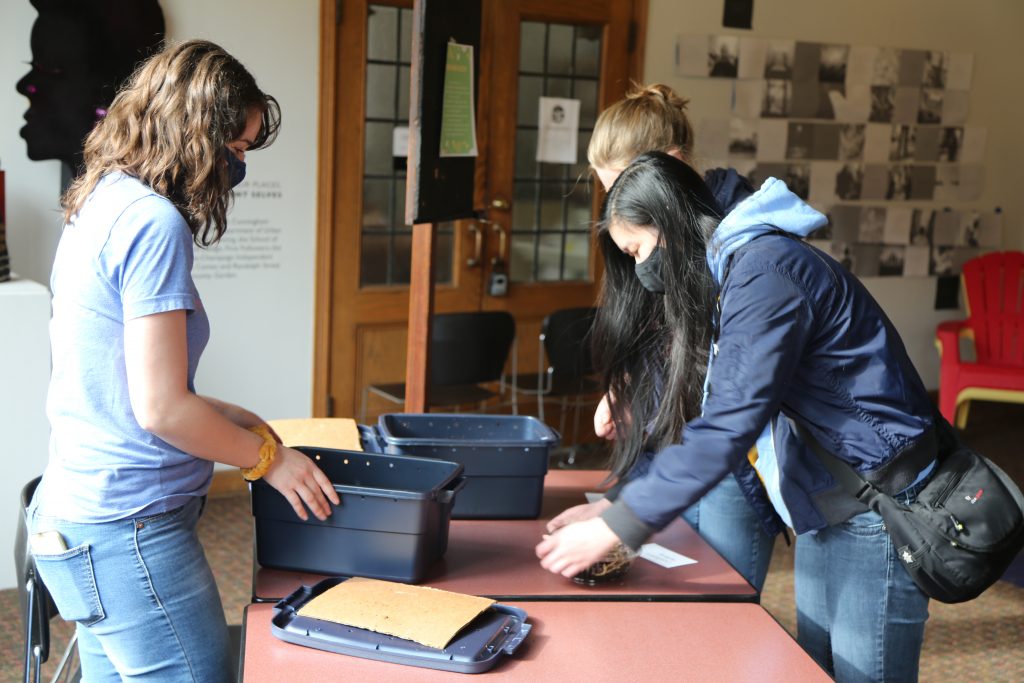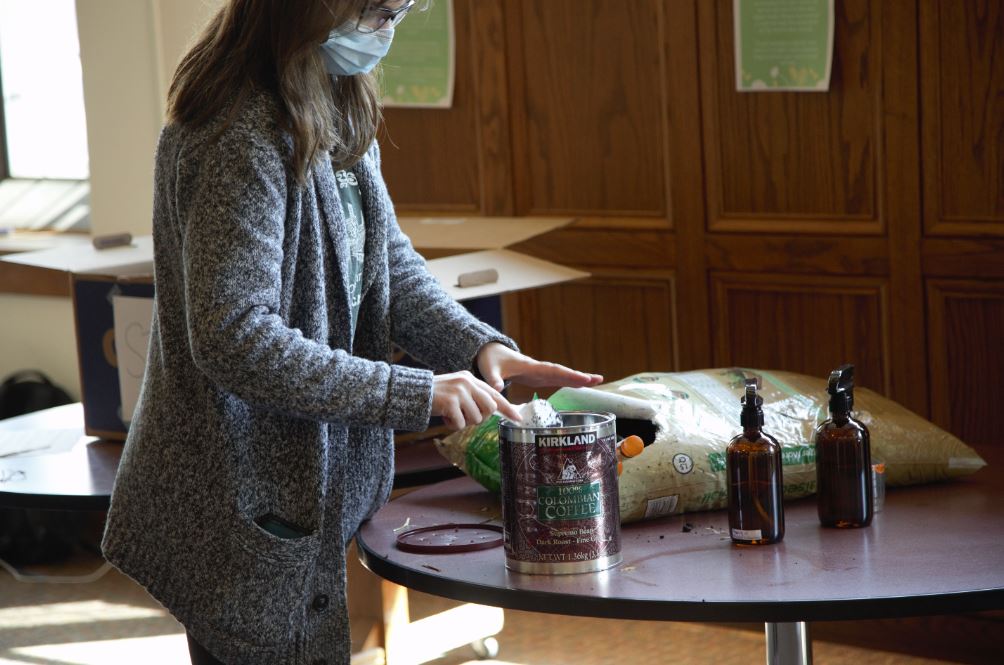
This post originally appeared on the Illinois Food Scrap Coalition (IFSC) blog. Thanks to IFSC and to Madalyn Liberman and Stuart Seputro, two of the groups’ founders, for their insights and assistance with this blog post.
“[Our project] vermiCUlture, which stands for vermicomposting in the Champaign-Urbana area, was started by myself and other Fred S. Bailey Scholar students at the University YMCA as part of the Global YMCA Youth Climate Summit in October 2020,” Madalyn Liberman told IFSC. “As part of this summit, we were tasked with creating a local solution to a climate issue with the chance to receive funding to address that issue. Our project was aimed at addressing the lack of sustainable food waste disposal options in the area by educating community members about food waste/composting and providing training and equipment for individuals to start vermicomposting in their home. We received a little over $9000 to implement this project and have been working on it since last October.”
“With the hope of involving more students on campus and to create a lasting project, we decided to become a registered student organization (RSO) at the University of Illinois this spring. The initial creators of the organization and current executive board members are Stuart Seputro (President), Lavanya Upadhyaya, Griselda Escobedo, Sophie Luijten, and Rebecca Hanks, but we have gained many more students since becoming a RSO. That will soon be showcased on our website,” said Liberman.
The student group notified CU area residents about the program through various newsletters and social media advertisements. Their initial goal was to get 50 participants to receive vermicomposting kits and training, with distribution provided on a first come, first served basis.
At this time, the group doesn’t have many metrics to share, but thus far, 48 participants have engaged with the program. “We were not able to get the full-size kits out to these 48 participants due to supply chain issues as well as issues regarding time and helping hands,” said Liberman. “Instead, we were able to start with a kickoff event with around 30 participants. These participants received mini educational kits containing 5-10 worms and were guided through creating worm bins using old food or takeout containers from their homes. This event, on April 17 and 18, 2021, allowed participants to come in and create their kit in an assembly-line style fashion with explanations about each component of the composting bin (i.e. bedding material, worms, water, etc.). While we weren’t able to get participants the full-sized kits this semester, we have actively been working with local businesses and organizations to take 3-5 gallon buckets off their hands that would otherwise be thrown away or recycled so that we can eventually upcycle them into our full-sized kits. Thus far we have diverted about 35-40 buckets that will be turned into vermicomposting bins. We also hope to source other waste materials for kits in the future, such as shredded paper/cardboard, coffee grounds or chaff from local coffee shops, or other materials that can be used in the creation of vermicomposting kits while also helping to reduce waste. Additionally, I hope in the future when we distribute full-sized kits, that we can calculate the reduced carbon emissions from our participants as well as our own carbon emissions in the sourcing and transport of products.”

The group ran into a few challenges while getting this project started, which they hope to address in the future. Liberman explained, “The main challenge we ran into was obtaining worms. There are not many local worm options that have the scale of worms needed for our project (500-1000 worms are needed for one full-size bin). So we needed to ship from across the country to get these worms (we used a supplier in Georgia), which isn’t the most sustainable option. Even still, it is difficult to get a large amount of worms at once. One of our new goals is to create a local worm option by creating a small-scale worm farm in the area. This new project is still very much in the planning phase and we are unsure of how it will work exactly but we are hopeful to get it started this fall semester and make vermicomposting more available to community members. Other challenges we ran into stemmed from all of our members also being full-time students. We quickly realized that the work we needed to do to make the project a success was the kind of work someone would do for a full-time job! To help alleviate this issue, we are planning to restructure the organization and make more leadership positions so that the work is distributed in a way that full-time students can manage.”
Executive board members have met over the summer for planning purposes. With the fall semester approaching, vermiCUlture has also obtained a $10,000 grant from the University’s Student Sustainability Committee (SSC). The SSC is comprised of undergraduate and graduate students who, with the guidance of faculty and staff, allocate $1.1 million for campus sustainability project annually from two student initiated fees–the Cleaner Energy Technologies Fee and the Sustainable Campus Environment Fee. The grant will help vermiCUlture meet their original goals, address the challenges identified above, and overall expand the process of vermicomposting in the Champaign-Urbana area.

While Madalyn Liberman is now off to grad-school (congratulations!) and thus, will not be involved in continued efforts in the fall semester, anyone interested in learning more or replicating this project in their own community can contact vermiCUlture President, Stuart Seputro. Also, be sure to check out their website, https://www.vermiculture.eco, and follow them on Facebook, Instagram, or LinkedIn to monitor their progress.
